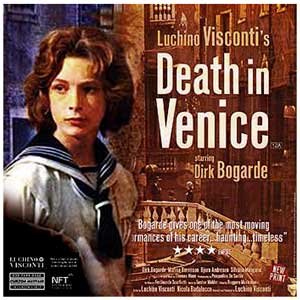 I recently read Death in Venice because I’m interested in the reasons why it seems like all protagonists in travel/expat novels die.
I recently read Death in Venice because I’m interested in the reasons why it seems like all protagonists in travel/expat novels die.The consul is murdered in Under the Volcano. Port dies of an illness in The Sheltering Sky. Kurtz dies in The Heart of Darkness, and you might even say that Marlow has died a kind of death as well. Although a character like Dick Diver isn't physically killed in Tender is the Night, he undergoes an equivalent psychological death.
I wonder if death is so pervasive in this genre of literature because travel causes an abandonment of routine, a loss of equilibrium or control, and an ironically threatening self-knowledge (but isn't self-knowledge supposed to provide salvation?). We travel to lose ourselves certainly, but I suppose we travel to die a certain kind of death as well--to kill off the self we live with but don't necessarily like or respect.
Or is it that when dislocated from home, one becomes vulnerable to fears—"the other," which can take so many forms, preys on one in any place that isn’t home? In fact, an “other” always functions as an antagonist in travel literature, whether it’s the protagonist’s true self, the threat of foreigners, real or imagined, or an invasive disease.
Aschenbach dies in Death in Venice--hardly a surprise, given the title--after letting his disciplined nature succumb to his hidden sensual and passionate side when he falls for the beauty of a young Polish boy, Tadzio.
He doesn't lose himself in just any place, however, but in Venice, which is a significant setting because of its history of moral corruption and decadence, its carnivals full of revelers wearing masks. Also, it stretches toward the East from the more controlled, orderly, and safe Western Europe. So, unlike, say, Strasbourg or Vienna or Prague, it's a fitting place for Aschenbach to abandon his restraint, to become more himself in effect.
Aschenbach's loss of reason, his disregard for the clench of disciplined will he's lived his life with, reaches a climax when he finds out that an Asiatic cholera epidemic is spreading in Venice. His love for Tadzio has such a pull that he doesn’t do the reasonable thing and leave Venice when the first signs of the epidemic occur.
Is the first genuine taste of passion worth the gamble of death--or does he tempt death simply because his mind has forfeited the hold of logic and will power? Both perhaps. It's interesting that only the powers of discipline, of reason, could have saved Aschenbach, and yet when he dies, it's not a sad death. He's died with himself, after all, in mental and physical peace.
For more, enotes provides a collection of critical essays.




No comments:
Post a Comment